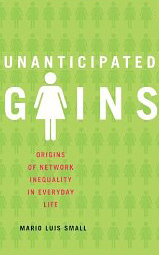| Sun | Mon | Tue | Wed | Thu | Fri | Sat |
|---|---|---|---|---|---|---|
| 1 | 2 | 3 | 4 | 5 | ||
| 6 | 7 | 8 | 9 | 10 | 11 | 12 |
| 13 | 14 | 15 | 16 | 17 | 18 | 19 |
| 20 | 21 | 22 | 23 | 24 | 25 | 26 |
| 27 | 28 | 29 | 30 | 31 |
CATEGORIES
RECENT ENTRIES
BLOG ROLL
City views
Professor Mario Small’s blog explores how organizations affect urban life.
The streets of some urban American neighborhoods are lined with amenities, including large grocery stores filled with fruits and vegetables: batches of ripe bananas, bushels of red tomatoes. But other, less affluent areas are “food deserts,” says sociology professor Mario Small, with high-quality produce sold nowhere in sight. He links to recent data on food deserts on his blog, Urban Orgs, which showcases research on urban organizations.
 Small, the author of Unanticipated Gains: Origins of Network Inequality in Everyday Life (Oxford University Press, 2009), cofounded Urban Orgs with Northwestern associate professor and fellow urban sociologist Celeste Watkins-Hayes in 2007. Their aim was to promote a neglected niche within urban studies. “For many years, much of the research on urban issues focused on one of two things,” he says: “either the behavior of individuals or on the neighborhood—which neighborhoods have violent crime, for example. But a few of us began doing research on organizations and realizing that a whole set of questions that were important to the urban condition and to the experience of cities was being ignored. Whether it’s the child-care center, the barber shop, or the nail salon, all of these organizations are an important part of living in the city.”
Small, the author of Unanticipated Gains: Origins of Network Inequality in Everyday Life (Oxford University Press, 2009), cofounded Urban Orgs with Northwestern associate professor and fellow urban sociologist Celeste Watkins-Hayes in 2007. Their aim was to promote a neglected niche within urban studies. “For many years, much of the research on urban issues focused on one of two things,” he says: “either the behavior of individuals or on the neighborhood—which neighborhoods have violent crime, for example. But a few of us began doing research on organizations and realizing that a whole set of questions that were important to the urban condition and to the experience of cities was being ignored. Whether it’s the child-care center, the barber shop, or the nail salon, all of these organizations are an important part of living in the city.”
Small and Watkins-Hayes e-mailed colleagues and culled through journals, discovering that urban scholarship had become increasingly focused on organizations. On Urban Orgs, Small and Watkins-Hayes write unsigned posts profiling such work. Recent entries address research on the Harlem Children’s Zone, on how nightlife establishments mitigate the effects of social and spatial isolation, and on the battle between rural and urban areas for prison population census numbers.
Says Small: “We’re hoping to convince researchers and policy makers—people who care about urban issues—that there is something important and distinct to be to be learned by looking at organizations and organizational issues.”
Katherine Muhlenkamp
RELATED READING
October 29, 2010
